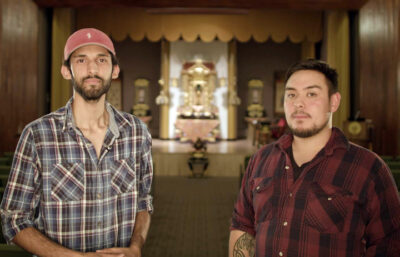The Nikkei Way documentary explores Japanese Canadian heritage in Lethbridge
By Dale Woodard on July 22, 2021.
 Submitted photo -
Filmmakers Arjan Gill and Kynan Gordon's project 'The Nikkei Way' was recently released through the Telus Storyhive documentary edition.
Submitted photo -
Filmmakers Arjan Gill and Kynan Gordon's project 'The Nikkei Way' was recently released through the Telus Storyhive documentary edition.Kynan Gordon’s documentary is one that hits close to home for him.
Working alongside fellow producer and best friend Arjan Gill, the duo’s project, The Nikkei Way, was recently released through the Telus Storyhive documentary edition.
The documentary is a journey through the eyes of a group of Japanese Canadians in Lethbridge, exploring their heritage, culture and connecting with the people who support their way of life in the community.
Gordon and Gill’s documentary was one of 40 projects selected out of 327 applications to receive $20,000 from Telus Storyhive’s Web Series Edition, supporting storytellers in creating, pitching and producing innovative comedy, drama or documentary web series pilots that reflect on experiences and stories found in their local communities.
“When we got the confirmation that we had gotten the Telus Storyhive documentary, we were ecstatic,” said Gordon, who grew up in southern Alberta and is part of the Nikkei Cultural Society. “It was very personal. It’s a Japanese Canadian documentary on Japanese Canadians in southern Alberta during the war and afterwards. There has been so much history done on the internment camps, nobody knew there was a whole history in southern Alberta.”
The topic of the documentary was close to Gordon, but so were the people he and Gill interviewed.
“Some were family and some were family friends, people I had grown up with and have helped take care of me since I was born,” he said. “The history itself is just mind-opening. The thing about Japanese Canadians and Japanese people in general is they don’t talk about these types of topics so much. But I wanted to dive into the history and show the world this is what actually happened here during the war. People were forced out into southern Alberta and were forced labour out in the beet fields.”
Gordon said the other half of his family had been in southern Alberta since the early-1900s, which presented another angle to the historical aspect of the documentary.
“They had completely different experiences during the war,” he said. “They were displaced and then there were the ones who were already out here whose lives changed a little bit, but not too drastically.”
Gordon said the experience of putting the documentary together was an eye-opener.
“Some of it was a little bit sad at the same time because of the things I learned. I never knew there were such atrocities done. Our interview subjects were older. They were in their late-70s and 80s and a couple in their 90s. They were always those people you thought were the nicest in the world and you never knew the history of what they went through.”
Gordon spoke of one of his interview subjects whose family had a farm in B.C. and lost it.
“When she was brought out here, all the other families were lined up a like a slave market and they were chosen last to go live on a farm as forced labour,” he said. “She went from having a beautiful fruit farm in B.C. to having to live in a shack with newspapers to put in the holes in the wall and drink horse water. In the middle of winter she had to go out with an ice pick, break the horse trough and that’s all she had to drink.”
But Gordon said in Japanese culture there’s a certain appreciation for everything in life.Â
“You talk about the experience, but you don’t talk about it in the sense of it was horrible and whatnot,” her said. “You have to be grateful for some of it. For example, the newspapers on walls, she was saying the farmers were nice to give her father newspaper to put on the wall. As my film partner and I were standing there, afterwards we were thinking, ‘What happens if they give them a little bit of wood to put on the walls instead of newspaper?'”
Gordon said his uncle he interviewed had the same mindset.
“There were bad things that happened during the war, some racism and whatnot, but he was more or less just passive about it. He said it was done and over with, so why linger on it?”
Gordon and Gill worked closely on The Nikkei Way.
“He has been my best friend for more than seven years now,” he said. “We went to school together. I could not have done it without him.”
Given the sheer amount of work they poured into the documentary, Gordon was grateful to work alongside his fellow director.
“It was out of this world, how much work had to go into this, mentally and physically and everything that goes into it,” he said. “It was day-by-day, making sure everything gets done in an orderly fashion. Having a great film partner to do it with, that is a true blessing. Especially when it’s your best friend and both of you trust each other wholeheartedly. You can get everything done and trust each other to do it. That’s a key thing.”
With The Nikkei Way now on Telus On Demand, Gordon said the goal is now to try and do a few festivals with the documentary.
The duo are already looking to their next project as well.
“Our next thing is going on to a feature film we’re working on right now.”
As they get ready to for that, The Nikkei Way is drawing favourable reviews.
“Very positive,” said Gordon. “And a lot of people saying very mind-opening in that they never realized this was all happening in Lethbridge and area.”
Follow @DWoodardHerald on Twitter
Follow @dwoodardherald on Twitter
3-2




